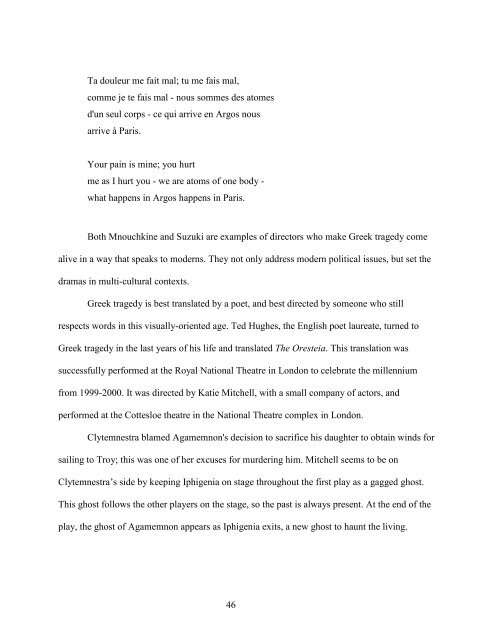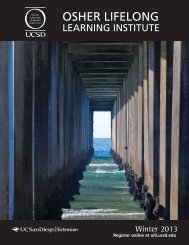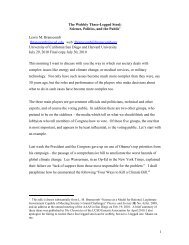- Page 1 and 2: Copyright 2010 The Living Art of Gr
- Page 3 and 4: Preface Ancient Athens in the fifth
- Page 5 and 6: Perseus was able to slay this monst
- Page 7 and 8: At first there was no such thing as
- Page 9 and 10: emphasizing one heroic character, a
- Page 11 and 12: Brief Textual History How we come t
- Page 13 and 14: Aeschylus (ca. 525 BC - 456 BC) Aes
- Page 15 and 16: Tragedies rarely dealt with histori
- Page 17 and 18: Seven Against Thebes illustrates th
- Page 19 and 20: lesser number, perhaps the usual nu
- Page 21 and 22: has more lines for the main charact
- Page 23 and 24: Other characters come and go: the f
- Page 25 and 26: which haunt families for generation
- Page 27 and 28: libations (hence the title) to prop
- Page 29 and 30: The Furies surround Orestes, dancin
- Page 31 and 32: Performance Tradition This is a ver
- Page 33 and 34: heights. This is a universe which n
- Page 35 and 36: with Adam. She confronts her mother
- Page 37 and 38: The language is poetic and engaging
- Page 39 and 40: who leaves with the city’s plague
- Page 41 and 42: Peter Stein staged a notable Oreste
- Page 43 and 44: ogler and grinder of Troy's golden
- Page 45: America, and India. The varying acc
- Page 49 and 50: inspired by or taken from the work
- Page 51 and 52: And worse: One group of soldiers ha
- Page 53 and 54: Charles Mee shows us the horror of
- Page 55 and 56: tells Jupiter (Zeus) the prophecy:
- Page 57 and 58: international conferences held sinc
- Page 59 and 60: Prometheus goes on to describe a re
- Page 61 and 62: him to write this play. After the S
- Page 63 and 64: Antigone, Oedipus Tyrannus, and Oed
- Page 65 and 66: and his wife dies cursing him. He h
- Page 67 and 68: At the end, we have the dead Haemon
- Page 69 and 70: to avoid what had been foretold, bu
- Page 71 and 72: Antigone and her sister, Ismene, wh
- Page 73 and 74: about Creon; nevertheless, he could
- Page 75 and 76: Electra has fascinated generations,
- Page 77 and 78: actress to express her sorrow. Just
- Page 79 and 80: Philoctetes is a late play, and the
- Page 81 and 82: The set should accommodate the desc
- Page 83 and 84: pain at the end really compensates
- Page 85 and 86: a crowd that rushed through the aud
- Page 87 and 88: western ones. The monumental qualit
- Page 89 and 90: It is an ideal machine designed by
- Page 91 and 92: trapped. Oedipus tries to catch it:
- Page 93 and 94: I swear by this sacred arm of Ogun,
- Page 95 and 96: show rebellious females who, compar
- Page 97 and 98:
hatred. Creon thinks he will have t
- Page 99 and 100:
made them the same height: there wa
- Page 101 and 102:
Oedipus did, but a better future se
- Page 103 and 104:
esurrected. This is very different
- Page 105 and 106:
countries over twenty years includi
- Page 107 and 108:
she agrees. He wants her to rehears
- Page 109 and 110:
teaching; Miller seems to have lear
- Page 111 and 112:
illusory war, created by the media.
- Page 113 and 114:
his adaptation and this director. P
- Page 115 and 116:
Beat on their bars together. A hung
- Page 117 and 118:
suggestively astride a satyr: the g
- Page 119 and 120:
The dates of performance for eight
- Page 121 and 122:
connected to the play, to highly ir
- Page 123 and 124:
audience. Admetus laments only late
- Page 125 and 126:
falling from the ship Argo, in whic
- Page 127 and 128:
Children of Heracles This play is a
- Page 129 and 130:
shocking for its original audience.
- Page 131 and 132:
Phaedra is guilty of an innocent's
- Page 133 and 134:
debate ensues between Hermione and
- Page 135 and 136:
The action takes place before the h
- Page 137 and 138:
This is a moving and dramatic play,
- Page 139 and 140:
and to be able to seek impartial ju
- Page 141 and 142:
The prologue is delivered by a farm
- Page 143 and 144:
The audience see the farmer's hut,
- Page 145 and 146:
By the end of the scene with Helen
- Page 147 and 148:
There has been criticism for the ra
- Page 149 and 150:
The Heracles in this play is differ
- Page 151 and 152:
Iphigenia tells Thoas the king that
- Page 153 and 154:
delivered Ion to his temple at Delp
- Page 155 and 156:
In the midst of the comedy, there a
- Page 157 and 158:
Menelaus plead with her. Helen make
- Page 159 and 160:
way to Delphi, but were detained be
- Page 161 and 162:
Antigone view the army from the pal
- Page 163 and 164:
Orestes may have been Euripides' la
- Page 165 and 166:
demands the life of Iphigenia. At f
- Page 167 and 168:
There are interesting roles for bot
- Page 169 and 170:
the wild forces that are disrupting
- Page 171 and 172:
moment when she recognizes her son'
- Page 173 and 174:
the violence with graphic detail wo
- Page 175 and 176:
Rhesus thought he could win the war
- Page 177 and 178:
It has been claimed that the first
- Page 179 and 180:
hero. Now as a suppliant, Jason lie
- Page 181 and 182:
The was a strong feminist slant, an
- Page 183 and 184:
Heiner Müller in his Medeamaterial
- Page 185 and 186:
making a monster of MEDEA like the
- Page 187 and 188:
Medea is also used in the colonial
- Page 189 and 190:
a heroine. The chorus are those who
- Page 191 and 192:
ecause they were convicted of crime
- Page 193 and 194:
also shows Brenda as essentially ma
- Page 195 and 196:
choose between being faithful to Ra
- Page 197 and 198:
captures the essence of Euripides'
- Page 199 and 200:
we see a beautiful night and Eben i
- Page 201 and 202:
his farm to Nance, but jealousy cau
- Page 203 and 204:
juxtaposition of the ship owners on
- Page 205 and 206:
duty in the Middle East, presumably
- Page 207 and 208:
Physical violence occurs with the C
- Page 209 and 210:
and what I want you to know is that
- Page 211 and 212:
He is certainly right about his cla
- Page 213 and 214:
HYDRA IS US. The many-headed Attis
- Page 215 and 216:
original actress, Kayoko Shiraishi,
- Page 217 and 218:
leader really needs only one virtue
- Page 219 and 220:
This is more about German history t
- Page 221 and 222:
for war, and there I was! We all kn
- Page 223 and 224:
Edward Chamberlayne is having an af
- Page 225 and 226:
Wilder’s satyr play shows how Apo
- Page 227 and 228:
Is like the body of a rat Trapped w
- Page 229 and 230:
Guymond de la Touche’s version (1
- Page 231 and 232:
although the Ion was a direct prede
- Page 233 and 234:
The distinction between divine law,
- Page 235 and 236:
Suzuki's Bacchae (1977) also shows
- Page 237 and 238:
Mahon changes this to: and they bri
- Page 239 and 240:
thing he never appears. It is gradu
- Page 241 and 242:
calling it "the wonderful, the myst
- Page 243 and 244:
Conclusion There are few versions o
- Page 245 and 246:
Texts: The standard Greek texts in
- Page 247 and 248:
----- Médée. Paris: la Table Rond
- Page 249 and 250:
----- Oedipe, Andromède, La conqu
- Page 251 and 252:
Gilbert, Helen, and Joanne Tompkins
- Page 253 and 254:
Jeffers, Robinson. Cawdor and Medea
- Page 255 and 256:
Müller, Heiner. Heiner Müller Rea
- Page 257 and 258:
Shechner, Richard, ed. Dionysus in
- Page 259 and 260:
---- The Greek Sense of Theatre: Tr









